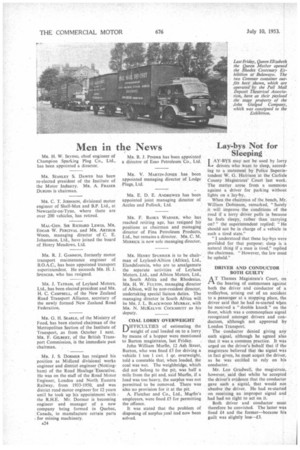Lay-bys Not for Sleeping
Page 26

If you've noticed an error in this article please click here to report it so we can fix it.
LAY-BYS may not be used by lorry La drivers who Want to sleep, according to a statement by Police Superintendent W. G. Harrison at the Carlisle County Magistrates' Court last week. The matter arose from a summons against a driver for parking without lights on a lay-by.
When the chairman of the bench, Mr. William Dobinson, remarked, "Surely it will improve the conditions of the road if a lorry driver pulls in because he feels sleepy, rather than carrying on?" the superintendent replied: "He should not be in charge of a vehicle in such a tired state."
"I understood that these lay-bys were praided for that purpose; sleep is a natural thing if a man is tired," replied the chairman. "However, the law must be upheld."
DRIVER AND CONDUCTOR BOTH GUILTY
AT Thames Magistrate's Court, on the hearing of summonses against both the driver and conductor of a trolkybus, arising out of an accident to a passenger at a stopping place, the driver said that he had re-started wtea he received a "double knock" on the floor, which was a commonplace signal recognized amongst drivers and conductors, although not approved by London Transport.
The conductor denied giving any such signal, although he agreed also that it was a common practice. It was urged on the driver's behalf that if the magistrate believed that the signal was in fact given, he must acquit the driver, as he was entitled to rely on his conductor.
Mr. Leo Gradwell, the magistrate. however, said that whilst he accepted the driver's evidence that the conductor gave such a signal, that would not absolve the driver. He had re-started on receiving an improper signal and had had no right to act on it.
Both driver and conductor must therefore be convicted. The latter was fined £4 and the former—because his guilt was slightly less—£3.












































































